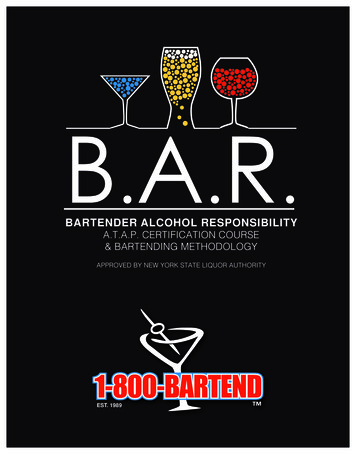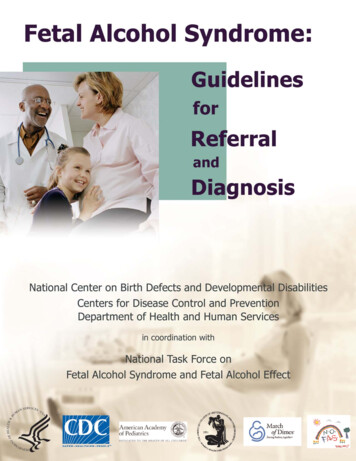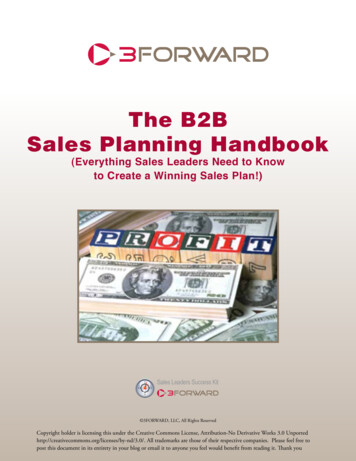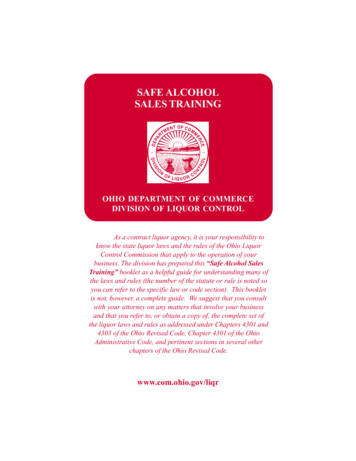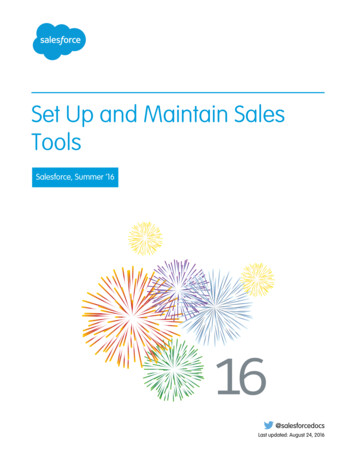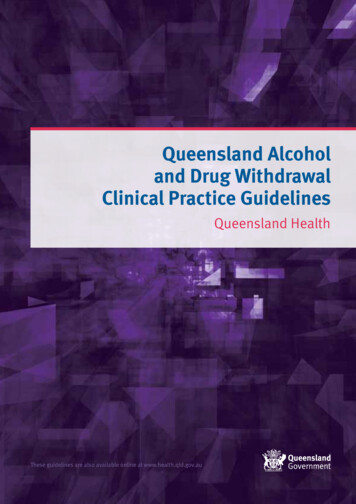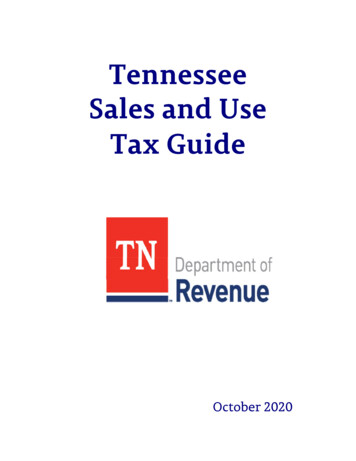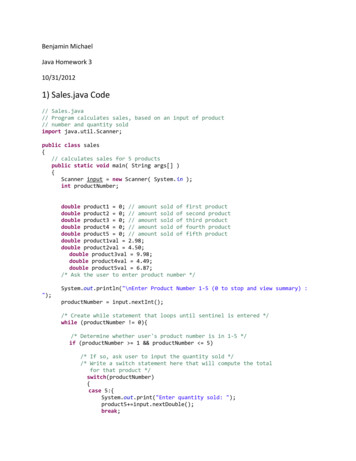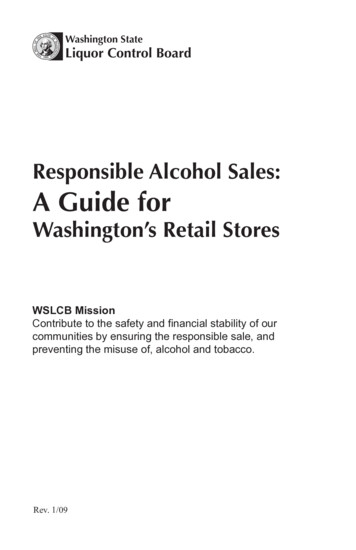
Transcription
Washington StateLiquor Control BoardResponsible Alcohol Sales:A Guide forWashington’s Retail StoresWSLCB MissionContribute to the safety and financial stability of ourcommunities by ensuring the responsible sale, andpreventing the misuse of, alcohol and tobacco.Rev. 1/09
An Open Letter to Washington’s Retail StoresWe are pleased to provide this Responsible Alcohol Sales Trainingbooklet to use in training your employees.People who sell alcohol shoulder a tremendous responsibility inensuring public safety. We have designed this booklet to providequick and concise tips for sellers of alcohol to make responsibledecisions. This booklet summarizes key responsibilities inpromoting the responsible sale of alcohol products and informationon our state’s liquor laws to apply in daily business operations. Ifyour establishment has a training plan in place, this can be usedas a supplement.Please feel free to make additional copies of this booklet. Inaddition to this booklet, please help your employees understandyour in-house policy on handling and selling alcohol productsresponsibly.For any questions or additional training materials, please contactKim Sauer, the Washington State Liquor Control Board (WSLCB)Alcohol Server Training program coordinator, at (360) 664-1727or KS@LIQ.WA.GOV.On behalf of the Washington State Liquor Control Board,Washington State Traffic Safety Commission, Mothers AgainstDrunk Driving, Washington Association of Neighborhood Stores,and the Korean American Grocers Association, thank you forparticipating in this educational program. Together, we can makeWashington a safe and productive place to live and work.Sincerely,Lorraine LeeAlan RathbunWSLCB ChairmanWSLCB Licensing and Regulation Directorpg.1
Responsible Alcohol SalesDid you know? Alcohol-related incidents are a leading cause of deathamong young people today. You could end up with a criminal record, serve time injail and receive a fine for selling alcohol to a minor or anapparently intoxicated person. Your store could lose its liquor license if you sell alcoholto a minor or an apparently intoxicated person. You could owe millions of dollars to someone you’venever met if you sell alcohol to a minor or an apparentlyintoxicated person and someone dies or is injured.You can save livesSelling alcohol is a serious responsibility. As a front lineemployee, you play an important role in ensuring that minorsand apparently intoxicated persons are not sold alcohol.The Washington State Liquor Control Board (WSLCB)appreciates your efforts to sell alcohol responsibly.Alcohol is a legal product that is available to individualsage 21 or older. Washington State law prohibits the sale ofalcohol to minors and apparently intoxicated persons.If you sell alcohol to a minor or an apparently intoxicatedperson, you and your employer could be held responsible forliabilities, death or damages from alcohol-related incidents.pg.2
Responsible Alcohol SalesProtect yourself by selling responsiblyIf you sell alcohol to a minor or an apparently intoxicatedperson, you could face serious consequences: If you sell alcohol to a minor, you could receive acriminal citation and you may have to appear in court.You could be fined up to 5,000 and have to serve up toone year in jail. If you sell alcohol to anapparently intoxicatedperson, you could receive acriminal citation and you mayhave to appear in court. Youcould be fined and face jailtime. Your job could be in jeopardy. Your employer couldsuspend or fire you. Your employer could be in trouble. Your store couldface fines or a liquor license suspension. If the store getsfour violations within two years, it could lose its liquorlicense permanently. You could be sued. If someone dies or gets hurt, youcould be sued for lost earnings, pain and suffering,medical and hospital expenses, etc. If an apparently intoxicated person purchasesalcohol, they could be cited and fined more than 1,000.pg.3Washington State lawprohibits the sale ofalcohol to minors andapparently intoxicatedpersons.
Checking ID: Making Legal SalesChecking identification is an important part of ensuring legalalcohol sales.Acceptable forms of ID: A Driver License, ID Card, or Instruction Permit issued byany U.S. state or Canadian provinceA Washington Temporary Driver License (paper license)A U.S. Military IDAn Official PassportA Merchant Marine IDA Washington State TribalEnrollment CardA valid ID must show: Date of birthSignature (except U.S.Military IDs)PhotoExpiration date (except TribalEnrollment Cards)How to check ID:Are they 21 yet?Is the customer oldenough to purchasealcohol today? Youcan print the currentversion of this signat www.liq.wa.gov.1. Ask for identification.2. Have the customer hand youthe ID. Do not accept or handle a customer’s wallet.3. Check the expiration date. Do not accept expired ID.4. Check the date of birth. For vertical Washington IDs,check the information to the left of the photo to make surethe customer has turned 21.5. Verify the photo matches the customer.6. Verify the ID’s unique features (see next section).pg.4
Checking ID, continuedVerifying an ID’s unique featuresMany IDs have special features that make it hard toduplicate or copy.The Washington Driver License and ID have the followingunique features: A black state seal overlaps the photoBranches from the bush overlap the photoThe mountain can be seen in the upper part of the photo100 Rule: The first two numerals of the license numberplus the year of birth should equal 100“Washington” appears in repeating, non-aligned text inlaminateUV light reveals a repeating state seal“Void” appears if the laminate has been altered. Do notaccept this invalid IDYou can buy guides with examples of DriversLicenses from all states. These guidesare sold at Web sites such aswww.driverslicenseguide.com.pg.5
Checking ID, continuedVertical IDsBe alert when checking a vertical ID.The customer was issued the ID when they wereunder 21 years of age. Check the unique featureslisted on the previous page, along with theinformation listed to the left of the photo to verifythe customer is 21 years of age or older.When you arechecking a vertical ID,always check thesection that says “Age21 ON.”Appearances can be deceiving!Certain features or behaviors may make it hard to judge acustomer’s age: Facial hair Nervous behavior Lack of eye contact Makeup Clothing Hesitant to provide ID Overconfidencepg.6
Handling Alcohol SalesCommon signs of intoxicationIf a person shows two or more of the following signs,he or she may be intoxicated. Do not make a sale. Careless or clumsy with money Slurred speech Unsteady walking A strong smell of alcohol Talking excessively loud Talking slowly and deliberately Belligerent behaviorNote about persons with disabilitiesSome customers may have a disability that affects theirspeech or motor skills. This may make it a challenge todetermine if they are showing signs of intoxication, so lookfor signs such as a strong smell of alcohol when making asale.Refusing a salePlease keep the following in mind when refusing a sale: Remain polite, tactful, and firm. Do not argue. Blame state law for your refusal. Offer to sell them a non-alcoholic beverage. Let them know you value them as a customer, but youmust follow state law. If a minor tries to buy alcohol, refuse the sale and takethe product away. Call the police if necessary. You cannot physically restrain a customer or takepossession of their car keys or vehicle. An intoxicated customer can remain at your businessif they do not have alcohol. Make sure they don’t askanother customer to buy them alcohol.pg.7
Handling Alcohol SalesKeeping a log bookA log book is a great tool for recording alcohol-relatedincidents. Ask your manager if keeping a log book should bepart of your daily routine. Dial 911!Use a bound notebook, soIf you ever feel unsafetorn pages are noticeable.when refusing a sale,Record the facts each day.don’t hesitate to call theNote days without incidents,police.and days you don’t work orthe store is closed.If a line is left empty, cross it out to prevent anything frombeing added later.Record the time, date, place, and a description of analcohol related incident and the people involved. Alsorecord any police action.Company policies about alcohol salesMany companies have in-house policies that guide theoperation of the business. These policies help all employeesconduct work activities in the same way.If your store has an ID scanner or utilizes age verifyingsoftware, make sure you understand its use.Many companies have policies about alcohol sales. Forexample, your store may require you to check the ID of everycustomer purchasing alcohol, regardless of how old theyappear.Before handling your first alcohol sale, make sure youunderstand your store’s policies. If you are unsure about apolicy, ask your manager for help.pg.8
Acknowledgment of UnderstandingAfter reading this handbook, I understand Washington State law prohibits the sale ofalcohol to persons under 21 years of age and apparentlyintoxicated persons. I know how to check identification and watch for signs ofintoxication to help me make a responsible sale. I know the types of identification I can accept, whatinformation must be on the ID, and what unique featuresare on a valid Washington State Driver License or ID.I understand that if I sell alcohol to a minor or anapparently intoxicated person: I could be sued if someone is injured or dies. I could be fired from my job, and face a criminal citation,fines and jail time. My store could be fined or have its liquor licensesuspended or revoked. I understand that I can contact my manager or the LiquorControl Board for additional training and information.Employee Name:Employee Signature: Date:Supervisor Name:Supervisor Signature: Date:pg.9
Contact InformationWashington State Liquor Control Board3000 Pacific Ave. SEOlympia, WA 98504www.liq.wa.govWSLCB Customer Service: (360) 664-1600To report a violation, call the WSLCB’s toll-free hotlineat 1-888-838-3956.Want to learn more?The WSLCB regularly holds free classes about the topicscovered in this guide at enforcement offices across the state.Find out more about our “Responsible Liquor and TobaccoSales” classes at www.liq.wa.gov.Contact the Licensing and Regulation Division forinformation about available educational materials at (360)664-1600.To obtain this publication in an alternative format, pleasecontact the WSLCB ADA coordinator at (360) 664-1783.pg.10
Checking ID: Making Legal Sales Checking identification is an important part of ensuring legal alcohol sales. Acceptable forms of ID: A Driver License, ID Card, or Instruction Permit issued by any U.S. state or Canadian province A Washington Temporary Driver License (paper license) A U.S. Mi

